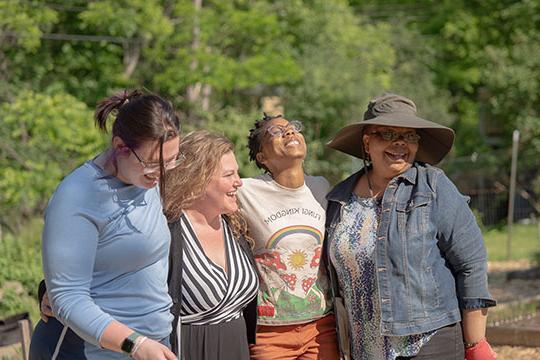Fruit and vegetable garden on Alfred University campus brought back to life

A fruit and vegetable garden on the south edge of the Alfred University campus is buzzing with activity, as students have been working since March to turn a weed-filled, overgrown lot into a place of vibrant growth and reflection.
The community garden was originally installed by students living in the former Environmental Studies House at 16 Park Street, which is now vacant. The plot, which had contained fruits and vegetables planted by students and members of the local community, had become overgrown in recent years.
This past spring, Freedom Cadet, a second-year graduate student in mental health counseling from Goshen, NY, reached out to Amy DeKay, vice president for Student Experience, proposing the possibility of planting a community garden on campus. DeKay told them about the garden on Park Street and reached out to the Environmental Studies faculty and Buildings and Grounds to receive the permission to begin sprucing up the property.
“It was quite overgrown,” Freedom commented. Work to remove weeds and cut down tall grass, put down mulch and repair the beds, and erect protective fencing began in March, with fruit and vegetables planted later in the spring. “We’ve really made a lot of progress in three months,” they said, noting that the student Summer Gardening Club, which has about eight members, worked with Freedom to bring the garden back to life.
In all, the garden contains 21 different beds, with vegetables including kale, cauliflower, broccoli, Brussels sprouts, tomatoes, peppers, carrots, beets, corn, beans, potatoes, onions, and squash; fruits including pear trees (which will bear fruit next year), cantaloupe, watermelon, and strawberries; and medicinal herbs like tulsi holy basil. One bed contains garlic which had previously been planted by a member of the local community. Everything grown in the garden is organic.

The community garden—before and after. Photo at left, taken in April, shows the community garden overgrown and in disrepair. Photo at right, taken from overhead with a drone just five weeks later, shows a spruced up garden, with vegetable and fruit beds rehabilitated and planted.
In addition to the student club, community members are welcome to participate in planting and maintaining the space. Much of the fruits and vegetables, once harvested, will be donated to the Alfred University Food Pantry and Freedom hopes to use some of the yield for community meals prepared and served at the Community Table cooking and dining facility in Powell Campus Center.
Freedom, who interns at the University’s Wellness Center located across Park Street from the garden, hopes to create non-gardening programs at the site, such as sessions for meditation and counseling of students. “There are studies that show the benefits of working in a garden, getting your hands dirty. It’s eco-therapy. The counselors at the wellness center are excited about this type of programming.”
They thanked DeKay for her assistance in making the concept of a community garden a reality. “Amy DeKay has been a huge help in getting Student Experience funding,” Freedom said, noting that Thomas Orrange, dean of Student Experience, helped out by running a power trimmer to cut down weeds. They added that Barbara Freeland, secretary for Public Safety, is experienced in organic gardening and has provided valuable insight and advice.
Freedom and members of the Summer Gardening Club who remain on campus this summer will work to maintain the garden, weeding the beds, harvesting fruits and vegetables as they become ripe, and bringing them to the Food Pantry. The group hopes to replace the wire fencing that encloses the garden with something that can better keep out animals scavenging for food.
They are pleased with how the garden has progressed and how it has improved the appearance of the property outside 16 Park.
“It’s so peaceful being here,” Freedom said. “It’s super rewarding to see plants sprout from seeds; it’s beautiful and amazing to see life flourish here. It really beautifies Alfred. People walking by comment on it.”
There are plans to install some benches in the garden, “where people can come and sit, take a break, and ground themselves,” said Freedom, who hopes the garden, with the help of the student club, will continue to be used next summer and beyond. “We want it to sustain itself.”
